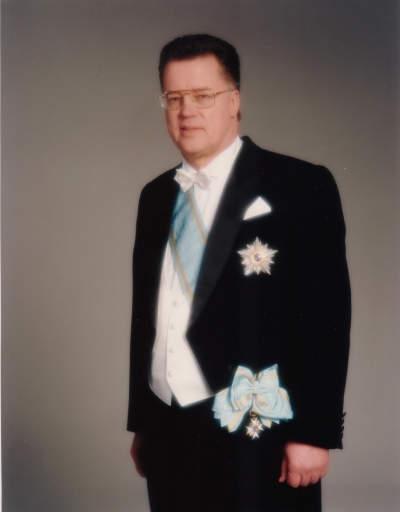Guntis Ulmanis was born on 13 September 1939 in Riga. His grandfather's brother, Kārlis Ulmanis, was the last pre-war President of the Republic of Latvia. His family was deported to Siberia, Krasnoyarsk Territory in 1941. They were given permission to return to Latvia in 1946, but the family had to reside in Ēdole, Kuldiga district, and later in Jūrmala since they were not allowed to settle in Riga. He studied at Pumpuri Secondary School in Jūrmala. On finishing the school, he entered the Latvian State University, Faculty of Economics, and completed the course in 1963. On graduation from the higher school, Ulmanis was called up for military service in the Soviet Army, where he spent two years. After the army, he began working as an economist in construction and later he worked for Riga Tram and Trolleybus Administration. He was appointed a Deputy Chairman of the Planning Committee under the Riga Executive Committee, but he was dismissed because of his family surname after a few months.
In 1992, Guntis Ulmanis was elected a Member of Council of the Bank of Latvia. In 1992, G.Ulmanis joined the Latvian Farmers' Union. During his presidency, Mr. Ulmanis had suspended active work in the Farmers' Party, holding the post of Honorary chairman. In 2001, he withdrew from Latvian Farmers' Union. In the course of parliamentary elections of June 1993, Guntis Ulmanis was elected as a Member of Parliament.
On 7 July 1993, the Saeima (Latvian Parliament) elected G. Ulmanis as President of the Republic of Latvia. With the active participation of Guntis Ulmanis, the Latvian-Russian agreement on the Russian Army withdrawal from Latvia was concluded in 1994, which was followed by the adoption of the Law on Citizenship. On 18 June 1996, G.Ulmanis was re-elected as President of the Republic of Latvia.
In 1996, G.Ulmanis declared a moratorium on executions and called on the Latvian legislation to cancel death penalty. In 1998, advocating the formation of a close-knit community, Guntis Ulmanis actively supported the amendments to the Law on Citizenship adopted in 1994.
On 18 June 1996, the Saeima elected Guntis Ulmanis again as President of the Republic of Latvia.
During Guntis Ulmanis’ presidency, special attention was paid to foreign policy, id est, integration of Latvia into international organizations, setting up and strengthening cooperation both with European and other countries. Conclusion of the Latvian-Russian agreement on Russian Army withdrawal from Latvia was one of the most important successes of Guntis Ulmanis’ presidency, which was followed by the adoption of the Law on Citizenship.
The President paid much attention to research of the history of Latvia and the issues related to its explanation. The Head of State set up a commission of historians acting together with the Prime Minister, whose task was a detailed study of totalitarian regimes and their impact on Latvia. The President of Latvia called on the international community to condemn the totalitarian regime of the former USSR.




